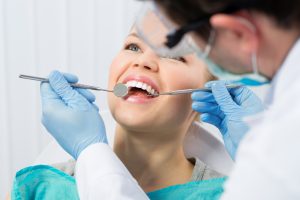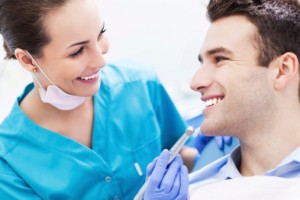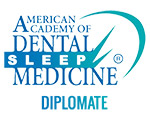 We all work hard to keep our smiles healthy with daily brushing and flossing and regular trips to the dentist, but even the most diligent oral hygiene routine can have gaps that allow for tooth decay or damage. That’s where a restorative dentist comes into play. A good restorative dentist will provide treatments that preserve the maximum amount of natural tooth structure and recreate lost dental shape and function. A restorative dentist does all of this while keeping in mind the way any treatment will impact the appearance of the smile and overall health. Suffice to say, finding a good restorative dentist is key to keeping a healthy, happy smile on your face. The good news is, the general dentist you trust with your routine oral health and hygiene visits is likely also a skilled restorative dentistry practitioner.
We all work hard to keep our smiles healthy with daily brushing and flossing and regular trips to the dentist, but even the most diligent oral hygiene routine can have gaps that allow for tooth decay or damage. That’s where a restorative dentist comes into play. A good restorative dentist will provide treatments that preserve the maximum amount of natural tooth structure and recreate lost dental shape and function. A restorative dentist does all of this while keeping in mind the way any treatment will impact the appearance of the smile and overall health. Suffice to say, finding a good restorative dentist is key to keeping a healthy, happy smile on your face. The good news is, the general dentist you trust with your routine oral health and hygiene visits is likely also a skilled restorative dentistry practitioner.
(more…)
August 9, 2017
What Does a Restorative Dentist Do?
July 21, 2015
Proper Tooth Brushing Techniques
 Brushing your teeth may be a habit that you take for granted. After all, most people begin to brush their own teeth around the age of 2 or 3 (with some adult backup), but what many of us don’t realize is we’ve never updated our tooth brushing techniques. Our teeth require different hygiene and care at different stages of our lives. One of the most essential elements of dental hygiene is proper tooth brushing, but if you’re still brushing the way mom or dad taught you as a child, you may not be cleaning your teeth effectively. Let the skilled staff at Donald Marks Family Dentistry help you make the most out of your daily tooth brushing routine. Call to schedule a dental hygiene appointment with our State Park, PA dental practice today.
Brushing your teeth may be a habit that you take for granted. After all, most people begin to brush their own teeth around the age of 2 or 3 (with some adult backup), but what many of us don’t realize is we’ve never updated our tooth brushing techniques. Our teeth require different hygiene and care at different stages of our lives. One of the most essential elements of dental hygiene is proper tooth brushing, but if you’re still brushing the way mom or dad taught you as a child, you may not be cleaning your teeth effectively. Let the skilled staff at Donald Marks Family Dentistry help you make the most out of your daily tooth brushing routine. Call to schedule a dental hygiene appointment with our State Park, PA dental practice today.
Tooth Brushing Recommendations from the Dentist State College, PA Trusts
When it comes to brushing, we recommend double checking the basics:
- Brush twice a day – brushing once in the morning and once before going to sleep is routine, and a 3rd brushing following your afternoon meal can be beneficial as well. However, all things should be done in moderation, and this includes tooth brushing. Done more than 3 times a day, brushing can damage gums.
- Check your brush – If you’re using a brush labeled “hard bristled,” one that is not American Dental Association approved, or one that is more than 3 or 4 months old, throw it out and get a new one. The ideal tooth brush should be soft or extra soft bristled to minimize damage to gums and maximize dental cleaning results. Always look for the ADA seal of approval when purchasing dental hygiene items as these have undergone more rigorous testing for effectiveness. Replace toothbrushes every 3 to 4 months to prevent contamination and maintain optimal brushing effectiveness. This includes mechanical tooth brushes. Make sure to purchase a mechanical brush that has replaceable heads.
- Check the clock – If you’re not brushing for at least two minutes, you are not thoroughly cleaning each tooth. Brushing longer than two minutes is even better. Many people gauge their brushing time using a timer, by brushing for the length of an entire song, or by brushing through a commercial break on television. Whatever trick you use, make sure to set aside at least 2 minutes every morning and evening to brush your teeth.
- Brush gently – Whether you apply a great deal of pressure while you brush or just a little, you are likely going to remove the same amount of plaque from your teeth and gums. Brush gently to avoid damaging soft tissue or causing gum recession. Holding your toothbrush with only 2 to 3 fingers like a pen, pencil, or paintbrush is a great way to build the habit of brushing with less pressure.
The Bass Method for Brushing
Many people are taught to brush their teeth as children using big circles or back and forth motions with the bristles flat against the outside and tops of teeth. Many children are never taught to brush the inside of their teeth at all. While these methods may be effective for children with poor hand eye coordination who are just developing the necessary motor skills to keep up their hygiene, there’s a reason we don’t brush our hair or wash our bodies the way we did when we were 3. Why would we continue to brush our teeth that way? For patients who want to start a more effective brushing routine, the Bass method is an option the team at Donald Marks Family Dentistry highly recommends.
How the Bass method works:
- Place your brush at a 45 degree angle to your teeth, against the gum line.
- Quickly move the toothbrush back and forth. The bristles should remain stationary while only your hand and the brush move.
- Count to ten, gently flick the bristles toward the biting surface of your tooth to shift plaque out from under gums, and proceed to the next tooth.
- Continue this process for each tooth inside and out.
- To clean the tops of teeth, place the brush flat on your biting surface and move back and forth keeping bristles stationary as you did with your other teeth.
- Count to ten and move to the next tooth. Continue until each tooth has been cleaned.
The Bass brushing method is preferred by many dentists and hygienists because it encourages increased periodontal care, and maximizes the effectiveness of each brush stroke. Ask your dental hygienist to explain or demonstrate effective brushing techniques for your, unique bite next time you visit our office.
Contact us for More Information
We’re always here to help, no matter what your dental care needs, but we’re dedicated to improved preventive care so our patients are more likely to retain their natural smiles for life. Call Donald Marks Family Dentistry to schedule an appointment today. Our State College, PA dental practice welcomes patients from neighboring communities Spring Mills, Centre Hall, Huntingdon, Altoona, Penns Valley, Boalsburg, Lemont, Bellefonte, Lewistown, and Phillipsburg.
April 7, 2015
Effective Periodontal Disease Treatment in State College, PA
Brushing, flossing, and rinsing are essential to keep your oral health in tip-top shape and stave off serious oral problems. Proper oral hygiene and regular dental appointments will prevent issues that can potentially build-up. Without routine brushing and flossing, or infrequent dental appointments, plaque, bacteria, and tartar form in pockets in the mouth, which can lead to periodontal (gum) disease. The disease affects thousands of Americans every year, and without proper treatment, the condition can lead to serious oral and health problems. The office of Donald M. Marks, DMD offers a comprehensive, effective treatment to combat periodontal disease.
How Do I Know if I Have Periodontal Disease?
 Every mouth is full of bacteria. Bacteria, along with food and other particles, will build sticky plaque on your teeth. Regular brushing and flossing will get rid of plaque. If the plaque is not removed, it will harden and turn into tartar, which can only be removed by professional cleaning. The longer tartar stays on the teeth, the more damage it goes to the teeth and gums. Some warning signs for periodontal disease include:
Every mouth is full of bacteria. Bacteria, along with food and other particles, will build sticky plaque on your teeth. Regular brushing and flossing will get rid of plaque. If the plaque is not removed, it will harden and turn into tartar, which can only be removed by professional cleaning. The longer tartar stays on the teeth, the more damage it goes to the teeth and gums. Some warning signs for periodontal disease include:
- Bad breath
- Red or swollen gums
- Pain when chewing
- Tender or bleeding gums
- Sudden sensitivity in your mouth
- Receding gums
- Loose teeth
How is it Treated?
Our experienced dentists and trained team of professionals have treated this disease on hundreds of patients. Containing and removing the infected areas are top priority. For initial periodontal treatment, we will apply a specific, powerful antibiotic powder, which reduces inflammation and brings infections under control. If the disease has spread throughout the mouth and into the roots of teeth, a more extensive approach might be necessary. We can scale – scraping tartar from above and below the gum line – the teeth and remove bacteria from the roots.
I Think I May Need Treatment
If you are noticing signs of gum disease, you need to schedule an appointment with our team immediately. Our experts can diagnose and treat periodontal disease and restore your oral health. We offer our perfected services to those who live in State College, PA, Spring Mills, Centre Hall, Huntingdon, Altoona, Penns Valley, Boalsburg, Lemont, Bellefonte, Lewistown, Phillipsburg, and the surrounding communities.




